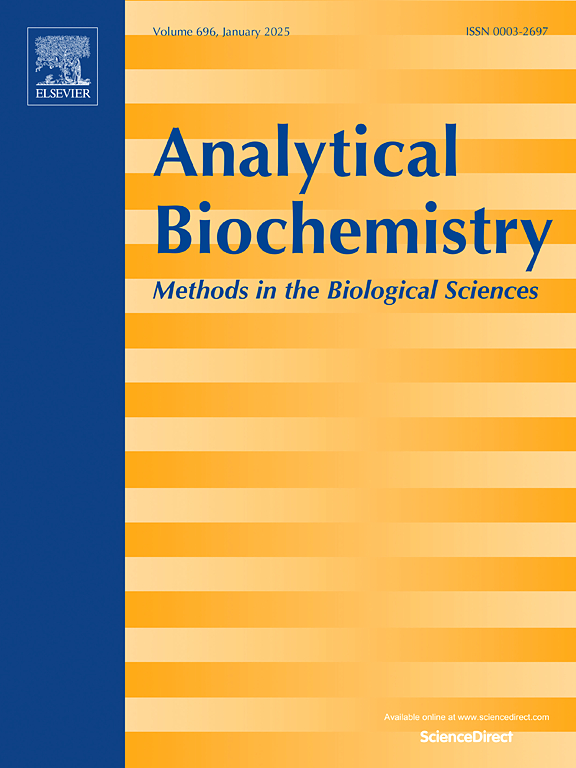Comprehensive review and meta-analysis of magnesium chloride optimization in PCR: Investigating concentration effects on reaction efficiency and template specificity
IF 2.5
4区 生物学
Q2 BIOCHEMICAL RESEARCH METHODS
引用次数: 0
Abstract
Optimizing the polymerase chain reaction (PCR) continues to be a major challenge in molecular biology, and obtaining the correct magnesium chloride (MgCl2) concentration is key to a successful reaction. A clear understanding of how MgCl2 affects PCR thermodynamics and kinetics is crucial for creating efficient and reliable protocols that work consistently. A systematic meta-analysis was conducted of 61 peer-reviewed studies published between 1973 and 2024. The study selection adhered to rigorous PICOS criteria, prioritizing experimental investigations that specifically examined the effects of magnesium chloride (MgCl2) on key PCR parameters. Data extraction and subsequent analyses were performed using standardized methodologies, with particular emphasis on template characteristics, reaction conditions, and their interplay in influencing PCR efficiency and specificity. The analysis showed a strong logarithmic relationship between MgCl2 concentration and DNA melting temperature, with an optimal ranges of 1.5 and 3.0 mM. Every 0.5 mM increase in MgCl2 within this range was associated with a 1.2 °C increase in melting temperature. Template complexity significantly affected the optimal MgCl2 requirements, with genomic DNA templates requiring higher concentrations than the more straightforward templates. This meta-analysis offers quantitative insights and evidence-based guidelines for optimizing magnesium chloride (MgCl2) concentration using polymerase chain reaction (PCR). These results demonstrate that the precise modulation of MgCl2 concentration, tailored to specific template characteristics, can significantly improve both the efficiency and specificity of PCR. These findings provide a robust theoretical framework for the development of template-specific optimization strategies and advance the design of more reliable and effective PCR protocols.
聚合酶链反应中氯化镁优化的综合回顾和荟萃分析:探讨浓度对反应效率和模板特异性的影响。
优化聚合酶链反应(PCR)一直是分子生物学中的一个重大挑战,而获得正确的氯化镁(MgCl2)浓度是反应成功的关键。清楚地了解MgCl2如何影响PCR热力学和动力学对于创建一致工作的高效可靠的协议至关重要。对1973年至2024年间发表的61项同行评议研究进行了系统的荟萃分析。研究选择遵循严格的PICOS标准,优先考虑专门研究氯化镁(MgCl2)对关键PCR参数影响的实验研究。使用标准化方法进行数据提取和后续分析,特别强调模板特性、反应条件及其在影响PCR效率和特异性方面的相互作用。分析表明,MgCl2浓度与DNA熔化温度之间存在很强的对数关系,最佳范围为1.5和3.0 mM。在此范围内,MgCl2浓度每增加0.5 mM,熔化温度就会增加1.2°C。模板复杂性显著影响最佳MgCl2需要量,基因组DNA模板比更直接的模板需要更高的浓度。本荟萃分析为利用聚合酶链反应(PCR)优化氯化镁(MgCl2)浓度提供了定量见解和循证指南。这些结果表明,根据特定的模板特征精确调节MgCl2浓度可以显著提高PCR的效率和特异性。这些发现为模板特异性优化策略的发展提供了强有力的理论框架,并推动了更可靠和有效的PCR方案的设计。
本文章由计算机程序翻译,如有差异,请以英文原文为准。
求助全文
约1分钟内获得全文
求助全文
来源期刊

Analytical biochemistry
生物-分析化学
CiteScore
5.70
自引率
0.00%
发文量
283
审稿时长
44 days
期刊介绍:
The journal''s title Analytical Biochemistry: Methods in the Biological Sciences declares its broad scope: methods for the basic biological sciences that include biochemistry, molecular genetics, cell biology, proteomics, immunology, bioinformatics and wherever the frontiers of research take the field.
The emphasis is on methods from the strictly analytical to the more preparative that would include novel approaches to protein purification as well as improvements in cell and organ culture. The actual techniques are equally inclusive ranging from aptamers to zymology.
The journal has been particularly active in:
-Analytical techniques for biological molecules-
Aptamer selection and utilization-
Biosensors-
Chromatography-
Cloning, sequencing and mutagenesis-
Electrochemical methods-
Electrophoresis-
Enzyme characterization methods-
Immunological approaches-
Mass spectrometry of proteins and nucleic acids-
Metabolomics-
Nano level techniques-
Optical spectroscopy in all its forms.
The journal is reluctant to include most drug and strictly clinical studies as there are more suitable publication platforms for these types of papers.
 求助内容:
求助内容: 应助结果提醒方式:
应助结果提醒方式:


